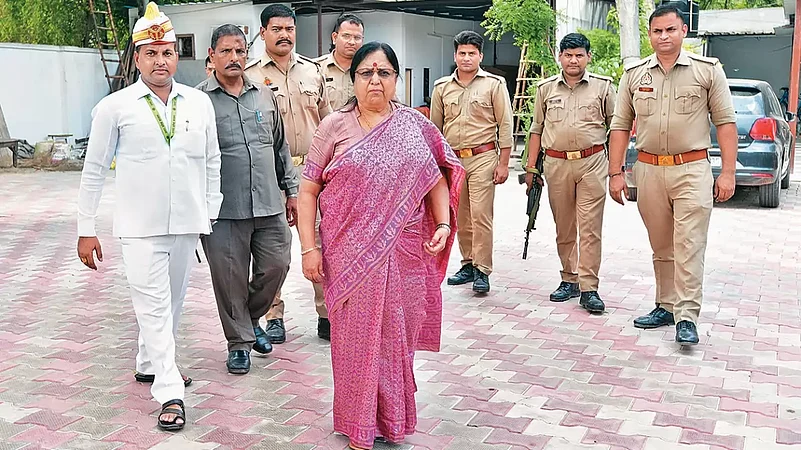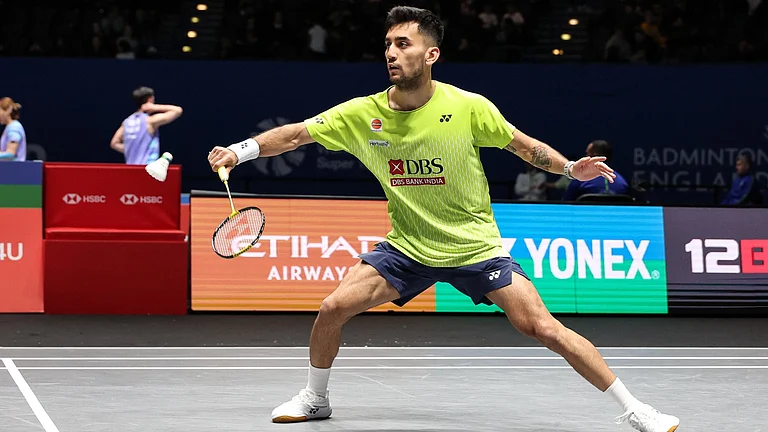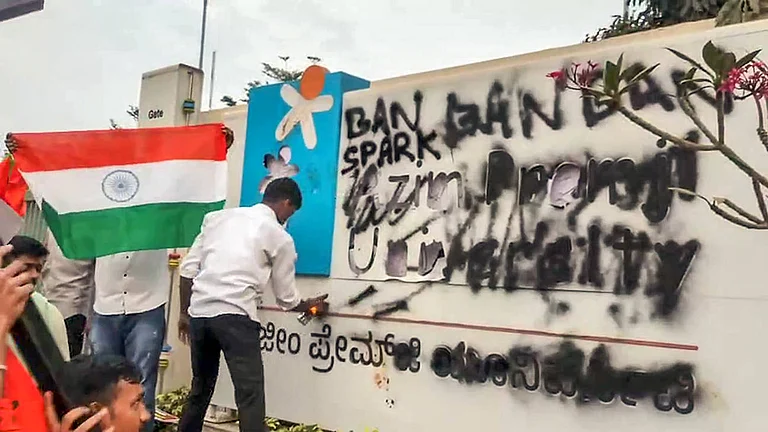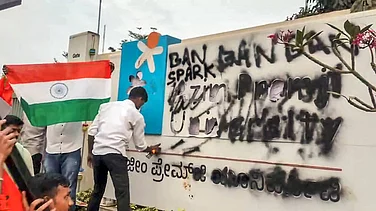The frail frame of Bhagwan Devi, 76, a resident of Uttar Pradesh’s (UP’s) Shyamo village near Agra, is animated and angry as she raises her fists and shouts expletives. “My husband died and now the Thakur goons have taken over my land,” the agitated woman yells as she sits on a plastic chair, her two sons trying hard to contain her outburst. Bhagwan Devi alleges that the village pradhan (chief) and lekhpal (village accountant), who belong to the upper caste community, had asked her for Rs 50,000 as a bribe to help her get back her land. “I have not eaten since morning and have walked 5 km to Agra on foot to meet the vidhayika ji (legislator). I will not leave until I get justice,” she states.
Her assertions are directed at the Agra (rural) MLA, Baby Rani Maurya, who sits across the table from Bhagwan Devi and her sons, patiently listening to her ordeal. Maurya—a cabinet minister in the Yogi Adityanath government with the women and child development department portfolio—holds Bhagwan Devi’s hand and implores her to calm down. She asks them to give her an application meant for the SDM which she signs and directs her officials to call the lekhpal and bring him to book. She says she would have done it herself, but she has a flight to catch. “I’m traveling to Bhopal on official work,” she tells Outlook, while rushing through her daily sabha which she holds in the foyer of her residence-cum-office in the Sabzi Mandi area of Agra. Amid hearing pleas—mostly pertaining to property or land-related disputes—and signing documents, Maurya finds time to attend to neighbours, who bring their children in school uniforms to meet her.
Belonging to the Jatav community, the same as Mayawati, Baby Rani Maurya is no newcomer to politics. In 1995, Maurya was the first woman to become the mayor of Agra. A veteran BJP worker, Maurya was appointed as the governor of Uttarakhand in 2018 by the Union Cabinet, though she quit the post in three years and later contested the 2022 elections, winning by a margin of 76,608 votes. She is an important leader for the party’s Dalit and backward caste vote banks.
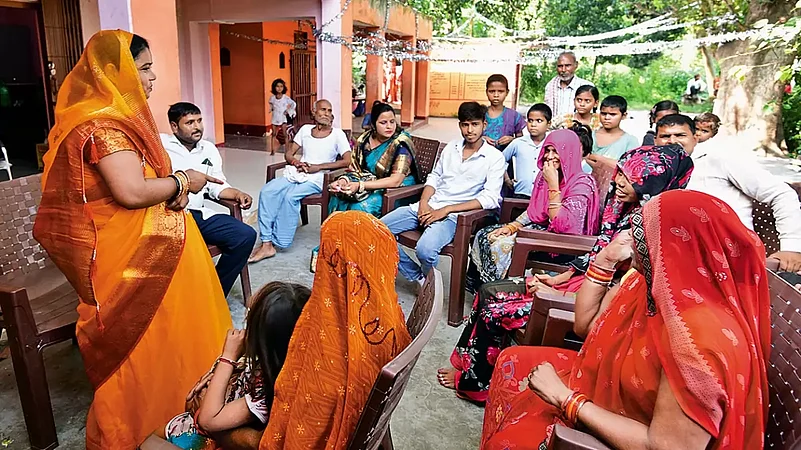
Maurya states that women’s participation in political leadership is the key to good governance. She isn’t the only one. A 2018 working paper titled Women legislators and economic performance of the United Nations University World Institute for Development Economics Research, noted that women-led constituencies were likely to prosper as women candidates were relatively less criminal or corrupt and found to be more efficient. They were also found less likely to pursue political opportunism than men in politics. Women legislators are perceived as more democratic, people-oriented and inclined towards a collectivist approach as opposed to their male counterparts. Women-led states often scored higher in developmental metrics like roads, healthcare and education.
“Every woman knows how to manage her household even with the most limited resources. And no one understands multitasking and budgeting better than the rural women of India. Women are better at prioritising developmental goals and streamlining economic activity as per the available resources,” says Maurya.
About 200 km from Agra, in Farrukhabad district, lies Kaimganj constituency, led by first-time MLA Dr Surabhi. Known for tobacco production and its recently flourishing self-run nurseries, Kaimganj has several vocal women pradhans who see Surabhi as their role model.
Munni Devi, the 60-year-old pradhan of Barjhala village, says that Surabhi encourages women to come out of their homes and speak. “She holds gram sabhas every Friday and visits three to four sabhas in a day,” says the first-time pradhan. Munni Devi was encouraged by her sons to fight for the panchayat elections and proudly says that she beat the former MLA’s grandson.
Shiva Gangwar, the pradhan of Paharpur Gram Panchayat, holds a bachelor’s degree and says that she would like to contest for higher elections and reservations can make that possible. As a pradhan, she tries to make herself as accessible as possible to her subjects, especially women. “Women often hesitate to bring up issues like domestic abuse or sexual assault to sabhas with male pradhans. The doors of my home are always open. More women come to me than to any other pradhan before me with their complaints,” she says.
Women at the helm does not necessarily mean better women’s safety, as even women leaders display skewed attitudes toward safety and gender-based violence. Maurya, for instance, had raised a controversy in October 2021 when, while speaking at an event, she said that women should not go to police stations after 5 pm and that if they do, they should be accompanied by their father, brother or husband.
Nevertheless, with its 47 women MLAs, the UP government has been making efforts to promote women in politics. In September last year, in a first, the state government held a special session of the assembly, where only women legislators spoke. At a time when religious and identity politics are ruling the roost, the session saw legislators, especially those from the opposition, raise issues like dispensation of sanitary pads in rural areas, waiving of school fees for girl students and pension for abandoned women. Global studies on “gender equality and peace hypothesis” show that areas with higher levels of gender equality are less likely to experience armed conflict and more likely to build peace after war. Does that mean women leaders don’t follow agendas that fuel conflict such as communal or religious polarisation?
Macchli Shahr’s first-time MLA, Dr Ragini Sonkar of the Samajwadi Party (SP), warns against looking at women leaders as secular or less patriarchal. “Women can just as zealously do religious politics and it’s wrong to say that they don’t participate in polarisation. In fact, women form a strong foot soldier base for Hindutva politics with their satsangs and pujas,” she says.
Despite Hindu nationalism being an intrinsically patriarchal system, the Hindutva movement in India boasts of a strong line of diverse women leaders such as Uma Bharti, Sadhvi Rithambara and the late Vijaya Raje Scindia. Inside Maurya’s office, a ceramic statue of Prime Minister Narendra Modi stands alongside the statue of the Buddha.
A member of the Anupriya Patel-led AD(S), which contested elections in alliance with the BJP in 2022, Surabhi’s Instagram account displays her frequent participation in Hindu religious functions.
Sonkar herself has a busy week lined up with several events of the Khatik community, to which she belongs. In Gurugram last week for the Jayanti (birthday) celebrations of Baba Durbal Nath Maharaj, the first saint of the Khatik Samaj (given sainthood by the BJP government), the SP MLA told Outlook that religion and caste politics cannot be evaded in UP, even if some of the leaders themselves may have little personal interest in it. “We have to look after our voters and connect with them. Promoting one’s community is an important part of leadership. But I also ensure that my work and the issues I raise in the assembly are related to people and not politics,” she says, insisting that when it comes to leadership, most women across parties tend to take decisions based on developmental metrics, rather than identity politics.
The reservations in panchayat elections provided the initial leg-up for women and gave them an entry point in politics. But the system has also been criticised for instilling an era of proxy leadership. Thirty-three-year-old Anju Rajput, who has been pradhan of Nangla Vasola village in Farukkhabad for two terms, states that initially, she used to rely on her husband for support. “It’s not possible for young women to directly jump into a male-dominated world of politics. We have to deal with a lot of problems regarding our own safety. Husbands or brothers are there to protect us sometimes,” she says. The situation is more complicated for marginalised women like Shiva Gangwar who not only fight against entrenched patriarchy but also against thousands of years of caste discrimination to emerge as leaders. Incidentally, Shiva’s brother is also a village pradhan, which helped her gain support among other men. Rajput nevertheless adds that the situation is changing. “There are many more women pradhans today, than a decade ago, who come to office and do real work. More women are educated now,” the pradhans agree.
Surabhi, a dentist by profession, says that such changes do not happen overnight, but rather have to be brought about through institutional efforts. “In my gram sabhas, I do not allow men to speak for women. To lead, women must be allowed to speak first,” she says. Apart from a nearly decade-long practice, Surabhi has an executive degree in healthcare management from IIM Calcutta. She echoes Maurya in saying that running a constituency is essentially a task of resource management and networking. “My management degree helped me to strongly connect with people and achieve effective campaign management at the grassroots level,” she says.
Since coming to power, the first-time MLA says that she has been working for structural issues that impact her constituency. “Kaimganj is a trading town, but the road connectivity was so poor and many villages did not have electric lights. I have ensured that electric lights were installed in over 100 villages and I have also got roads made in the area to allow ease of movement,” she says. Residents of her constituency attest to it. “When this area got flooded, vidhayika ji travelled by motorboats to visit inundated areas and reassure people. No previous MLA has had that kind of relationship with the people,” says Naveen, who owns a nursery in Kaimganj. Villagers add that the MLA has also worked for the eradication of illegal manure sales in the area, which has brought relief to those working in the nursery sector.
Meanwhile, Sonkar, who beat the BJP’s Mihilal Gautam in Macchli Shahr, has been working on improving healthcare services and facilities in her constituency. A first-generation doctor from the historically marginalised Khatik community, Sonkar says that the Covid-19 pandemic made her realise how pathetic the condition of the healthcare system in the country was. Her speech in the special session of the Vidhan Sabha about the sexism that women politicians face also garnered a lot of attention on social media.
The 33 per cent reservation bill for women in Parliament and legislative assemblies, feels Sonkar, is a landmark decision. The lack of clarity regarding the implementation of the bill, however, leaves one wanting. “Women’s leadership is ready. We are waiting for opportunities and when we get them, we do well,” says Sonkar.
For now, reservation remains a dangling carrot for women like Bhagwan Devi and thousands of others who could benefit from better representation but remain unheard amid the applause for ‘Nari Shakti Vandan Adhiniyam’.
(This appeared in the print as 'How Women Lead')


